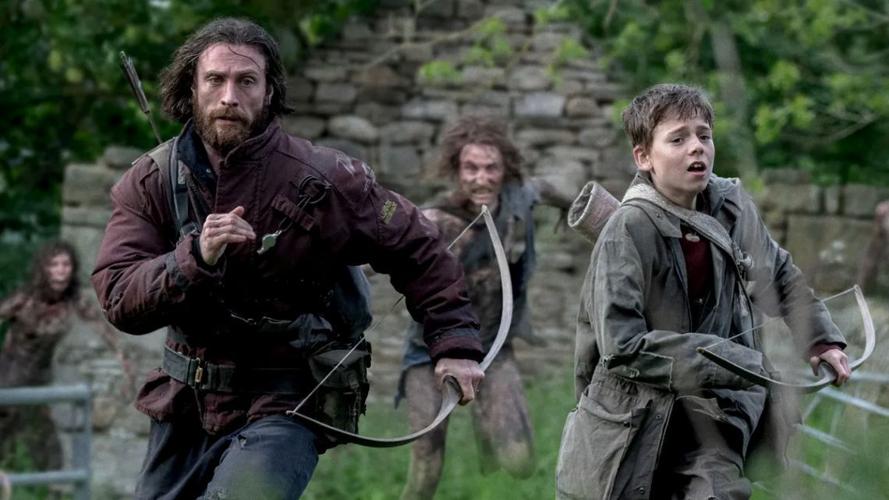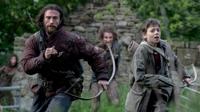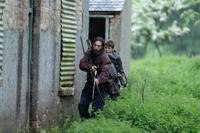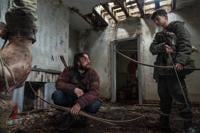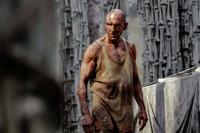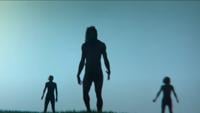This is the third film in the series that started with 28 Days Later (2002) and continued with 28 Weeks Later (2007). This is a franchise that began before the so-called Marvel Cinematic Universe or MCU. The MCU became all about building a continuing story line with characters that would appear and pop up in subsequent installments. In the 20 years since, it seems as if this franchise has adopted some of the same tactics of the MCU. Basically, this film sets up future films. Literally, this film opens with a scene that is setting up a character that isn't the main character here, but one of the characters of the next, and it's been confirmed that there will be a next film. There are several scenes that hint at that film, but it isn't explored. It's meant more to be a hook to carry us to the next film, which won't come till next year.
If you haven't seen the previous films in this franchise, it's basically a zombie film, a genre popularized by George A. Romero's Night of the Living Dead (1968). There have been tons of zombie films since and most of them copy the idea that Romero first laid out, which is that zombies are reanimated corpses that are cannibalistic. Also, if you're bitten by one, you become a zombie yourself. I don't believe that Romero ever established a scientific cause for zombies, as anything more than a mystical or magical phenomena, having been inspired by voodoo. Other properties like The Walking Dead (2010) implied that zombies are caused by a pathogen that isn't only transmitted through bite. The TV series The Last of Us (2023) has outright stated that the cause of the zombie apocalypse was due to airborne spores from some fungus, not unlike the recent COVID-19 pandemic. It made The Last of Us the perfect representation of 2020's health concerns.

What made 28 Days Later unique was that writer Alex Garland made the so-called zombies not simply slow-moving corpses that hardly had any strength or vitality but instead Garland's monsters were very much fast-moving and robust. In Romero's world, the zombies shuffle after you at a speed that any able-body person could outrun. In Garland's world, the zombies run after you at speeds that could outpace Usain Bolt and manhandle you with a muscularity that could give a super-hero in the MCU an arm-wrestle for their money. Arguably, Garland could have also ripped off Romero's The Crazies (1973), which was about a virus that turned people into mindless, hysterical and homicidal maniacs. Yet, Garland's idea was not unlike the zombies in The Last of Us, which probably took some queues from the 2002 classic. However, that video game adaptation just aired its second season, a month or so before this film's release, so The Last of Us was front and center on the mind. The comparisons continue because this film is also about a parent and child having to survive these kinds of monsters.
Aaron Taylor-Johnson (Kraven the Hunter and Bullet Train) stars as Jamie, a father living on an island just off the coast of Scotland in the United Kingdom. That island is a safe haven that has been fortified due to the result of the rage virus that turns people into crazy, cannibalistic killers whose bite or blood would turn you into the same. Their fortified home is very reminiscent of how Medieval castles would be fortified, using the wood from the nearby mainland, which is accessible only for a few hours during low tide and a causeway that gets flooded during high tide. If you're familiar with the series The Last of Us, Jamie is the Joel of that show. He can be a brutal killer and often can be a liar to his one and only child. He loves his son and lying to him is his way of protecting the boy, but it does build up resentment.

Alfie Williams, in only his second feature, co-stars as Spike, the aforementioned 12-year-old son of Jamie. Again, if you've watched The Last of Us, he's the Ellie of this film. He's having to learn to survive in this post-apocalyptic world. Like Ellie, it involves learning to go out from the gated walls and hunt to kill the zombies. Like Joel did with Ellie in Season 2, Jamie takes Spike out on an exploratory and training mission, showing him to defend himself from the zombies, using their weapon of choice, a bow-and-arrow. However, Spike is more curious to know if there are any other normal people outside of their island. Specifically, Spike is looking for a doctor who can help his mother who has been suffering from some illness that has yet been identified.
When Spike learns of an old legend that's about a doctor who lives on the mainland, Spike becomes determined to find that doctor, so that he can help his mother, Isla, played by Jodie Comer (The Bikeriders and The Last Duel). A good chunk of the film then becomes about Spike and Isla on a road trip to find this doctor. Along the way, they have to escape zombies and there are some interesting moments. There are of course gruesome scenes as well. Filmmaker Danny Boyle who directed the 2002 flick does so here and depicts these moments with a kind of freneticism, such as quick editing and even quicker camera movements to emphasize the excitement and the danger. Another reason could be the fact that nearly every zombie in this film is naked. He has tons of fully nude actors playing zombies running around, so the quick editing could be the result of not wanting to be so crude or prurient.

If one has no interest in zombies or this particular brand of horror action, there is more of a family drama aspect to this film that is somewhat effective. As mentioned, The Last of Us could be seen as a metaphor for the COVID-19 pandemic, even though the game on which it's based predates that pandemic. It might be a stretch, but this film in some aspects could be a metaphor for cancer, which is obviously a disease or disorder that doesn't have that many parallels to the so-called rage virus. Yet, when it comes to the actual virus in question, it's not often that the characters in this franchise slow down to really reckon with what it is and what it might do to the individual from an internal perspective. Using cancer as a proxy, this film is possibly able to do that to some degree.
Oscar-nominee Ralph Fiennes (Conclave and Schindler's List) also co-stars as Ian Kelson, a medical doctor who has learned how to survive the zombies without needing to be fortified within a castle-like structure. He basically lives in the forests of the Scottish Highlands. He has a very zen calm about everything that's happening. He might seem insane from the outset, but he's revealed to be very smart and very straightforward. He has a peace and resign to him that's very sturdy and very reassuring. It would have been interesting to see how he managed in his isolation for so long because it seems unlikely that he could have.

Chi Lewis-Parry is a former MMA athlete. He specialized in kickboxing. He's 6-foot-9. He plays one of the zombies in this film named "Samson." He's referred to as an "alpha," which is supposed to be a smarter than your average zombie. From Romero to The Last of Us, this idea of a smart zombie has been a concept for a while. Through Samson, we also get another concept that has been done in one or two previous zombie films and even more recently in The Last of Us, and that's someone who's pregnant, giving birth after they've been infected and what happens to the baby. This film doesn't quite confirm if the woman in question was pregnant before or after getting infected. The film suggests that Samson is the father, but that's never confirmed, but seeing if a zombie can impregnate someone would've been intriguing to explore. Yet, maybe that's just another set up for the next film next year.
Rated R for strong bloody violence, grisly images, graphic nudity, language and brief sexuality.
Running Time: 1 hr. and 55 mins.
In theaters.


